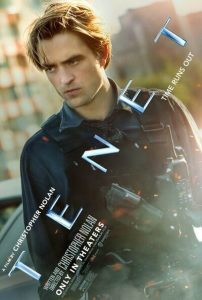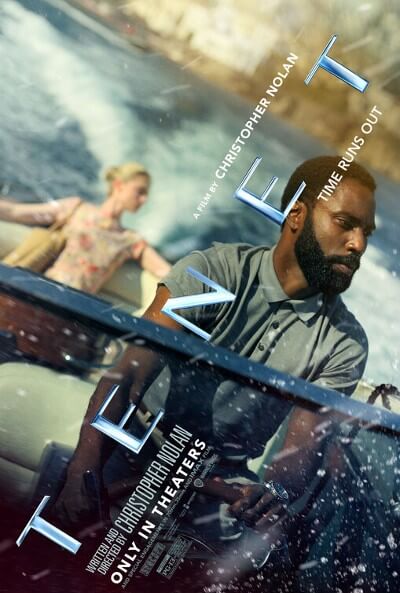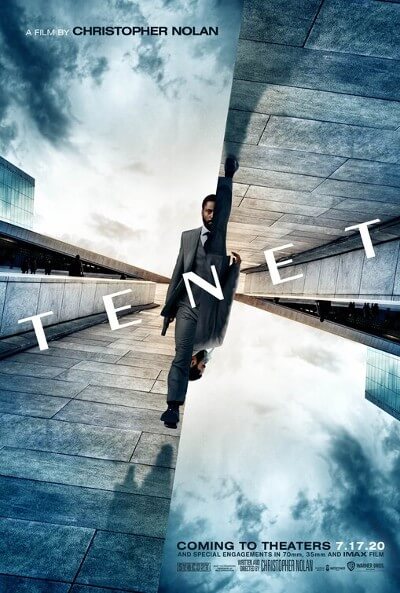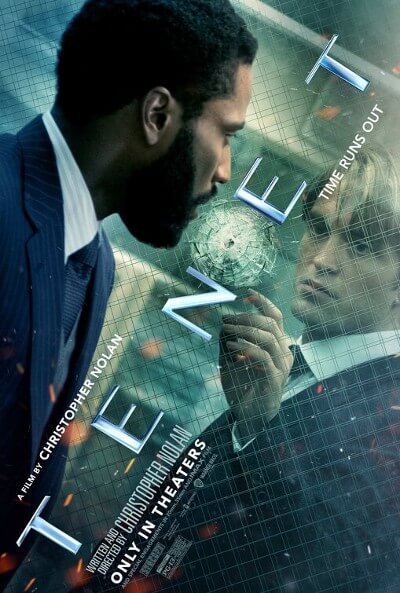Like most Christopher Nolan movies, he tries to have an emotional core, in this case a mother who loves her son and needs a bit of redemption and a guy who…. well that’s one of the problems. He’s willing to risk himself and all sorts of annihilation for a woman he basically just met. So that part I didn’t buy at all. And the rest of the emotional strings, Nolan can’t quite play them right. It’s another movie where everyone talks about emotions but the audience doesn’t feel them.
Nolan does logic well and intricacies so every question finds its way to an answer… eventually. Tenet is one of the more solid and reasonable time travel movies. You still run into a bit of ‘if she killed him on the boat then how did everything after that moment play out the way it did the first time through the movie?’ But also you have two versions of the characters, one to carry the story and one to end it. And there’s also the paradox of being the character in the past that influences events in the future so they play out again the way they did the first time–but how’d they do it that way the first time if you hadn’t gone into the past yet? Paradox.
And yet, when Neil (Robert Pattinson) is walking away explaining how he got there, it’s oddly satisfying and intriguing. It’s the moment that you think this could be a franchise because I want to know more. I want to see what happened and how it happened and kind of instantly I like these characters better in that moment then I have the entire movie and I want to see and experience more stories.
That’s one of Nolan’s particular gifts with storytelling. His movies leave you unsettled and sometimes in a bad way (The Prestige was interesting but I don’t think I can handle it again. Memento definitely not. Interstellar is a long slow descent. ). And sometimes in a good way (Inception is layers of fun, if in a dry sort of way–the first time I walked away and couldn’t shake it for hours). Tenet is on the fun side, in a way. If I can’t watch a movie with these characters beginnings then I might as well go back and watch this adventure with them again.
Hopefully, I’ll understand them better the next time, though. I’m fine with movies that have accents or foreign languages and subtitles. But I don’t like when I can’t hear the characters. Pile low audio onto accents and succinct dialog and it’s easy to feel like you’re not quite following the story. I suppose the audio is better if it’s in a theater or surround sound. But on a normal tv it was not an ideal sound mix (the music sometimes was as loud or louder than the dialog which never works well).
There’s also an interesting editing style with quick cuts between scenes, little to no transition and a sense of coming in too late, like you’ve missed something between here and there. I think this was intentional since the movie is messing with time. It wants you to experience that sense of disorientation. And maybe that contributes to that unsettled feeling at the end that things are done and not finished at the same time. Normally I’d lament the cuts but I think in this movie they serve their purpose.
That being said, the initial conceit with inverted bullets is weak. Perhaps because I was waiting for the Wanted moment where they reveal the tactical advantage and there isn’t one to catching bullets. Later in the movie we get that an inverted person would need inverted bullets for them to work. Which makes the opening bit really a showcase of inversion for the protagonist and the audience. Dreams within dreams felt more solid and well developed than inverted time, but maybe that’s in part because the characters were sometimes difficult to hear.
One thing I appreciate about Nolan, however, is that he isn’t afraid to talk to his audience directly without breaking the fourth wall. “Don’t try to understand it. Feel it.” the scientist, Barbara, tells Protagonist and in a way she’s also telling the audience. Don’t spend too much time trying to sort out the logic of time travel. Experience the story. (Though “feel it” is an interesting expression in a Nolan movie.)
And the goals of the story keep shifting which makes the whole thing feel a bit disjointed (aided by the quick editing). The writing keeps the audience following the changes and in some ways it works because the goals keep changing on the characters too, so it’s an unfolding of the story. But it still leaves the head spinning a bit.
I think part of what makes Nolan movies so intriguing is what he doesn’t say. They’re not for the masses (or the lowest common denominator) though they make a ton of money. I think that’s a result of his blending innovative action into the story. But the story itself leaves a lot unsaid. He relies on the performances of talented actors, on the shots and the beats to create spaces within the story. The dialog, as mentioned above, is succinct and sometimes vague, not enough to be confusing but enough to not say everything so the audience can infer emotion, intention and meaning. Engaging with the story by bringing out imaginations into those spaces may be part of why the films linger.
The score sounded an awful lot like Inception, but that aligns with Nolan’s style. It doesn’t have quite the dramatic cues but it suffices. And I think the performances are as good as they can be. You have to be focused in a Christopher Nolan movie and at least seem smart and these actors all pull it off. Kenneth Branagh gets to be violent and angry and Elizabeth Debicki gets to be vengeful. Everyone else pulls off stoic as expected, though somehow Robert Pattinson manages just a touch of humor and warmth that’s almost endearing. John David Washington is interesting because he doesn’t show much emotion throughout but you still get a sense of what he’s going through and he carries the film well enough. But everything in a Nolan movie is much more about what the characters think than what they feel and this one rather requires a good bit of thinking.






































